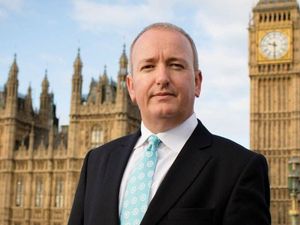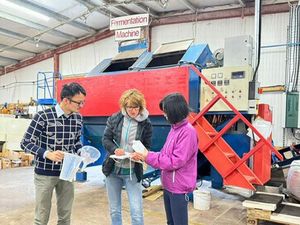New chief executive of Shropshire-based Organic Farmers & Growers looks ahead to 2025
The new chief executive of Shropshire-based organic certification body Organic Farmers & Growers has shared his reflections on farming and hopes for the year ahead and beyond.
Following leadership roles at NSF, SAI Global, and with the farming charity, Addington Fund, Bill Young recently joined OF&G and said said the opportunity to lead the organisation "really jumped out".
"An aspect of the role that appealed at once, is the fact that OF&G is a Community Interest Company (CIC)," he said.
"It is British owned and overseen by a board, primarily made up of British farmers.
"To me, that’s very important. Far too many farm assurance schemes are controlled from overseas. I believe that licensees’ fees from UK farms should provide a benefit to the domestic market."
Bill has been appointed to continue growing OF&G as one of the leading certification bodies, following Roger Kerr’s 10-year tenure.
The organisation is already in a strong position, with sound financial standing and already responsible for certifying over 50 per cent of all organic land in the UK.
"OF&G continues to be a magnificent platform for promoting improved food security through environmentally benign farming practices," he said.
"We’ll also continue to support our existing licensees by ensuring the voice of the organic community is represented at the highest levels.
"In just over a month as chief executive, I can already see a huge opportunity to deliver real growth for the organic sector.
"Currently, organic makes up 3 per cent of the UK’s agricultural land area, so there’s a significant opportunity for expansion."
He said recent agricultural policy has continued to focus on the delivery of public goods through improved environmental outcomes, with farmers being encouraged to introduce more sustainable practices.
"An organic approach is inherently supportive of these goals and offers a clear path forward to achieving Government’s objectives," added Bill.
"However, we must remember that environmental protection and food production are not mutually exclusive.
"Fundamentally, all agricultural systems exist to produce food, yet this does seem to get overlooked by policymakers on occasions. Organic provides a blueprint for fulfilling both requirements.
"For me, one of the biggest issues we face as a nation is food security. In just 30 years the country’s self-sufficiency for producing food has fallen from 78 per cent down to 62 per cent today.
"Additionally, when you consider that we import 84 per cent of fruit and 47 per cent of vegetables, you soon see the inherent vulnerability of our food systems.
"To resolve this, there needs to be a drive towards increasing food availability, while ensuring nutritional quality, improving accessibility and stability of supply.
"Unfortunately, Whitehall appears reluctant to address the issue of self-sufficiency or to protect those who are essential for delivering greater food security – our farmers.
"The disconnect that exists in terms of people thinking that you can't protect the environment while increasing food production is concerning because it’s simply not true.
"There are schemes that have repeatedly shown that it is possible to do both simultaneously, organic being one of them. This needs to be championed to a greater extent so we don’t fall victim to the fragility within the supply chain. The harsh reality is that we’re always just three days away from empty supermarket shelves.
"During the pandemic, we saw people switch their shopping habits and start discovering local farm shops. At the time there were positive signs of a real connection with the supply chain developing. However, many consumers have fallen back into old habits where price is king.
"The average UK household spends just 8% its outgoings on food consumed at home. This puts us in the bottom three countries in the world. This compares to 40 years ago, when that spend was around 30% of household income.
"But affordability does not always equate to equity and there are still elevated levels of food poverty with 17 per cent of children living in food insecure households. There's a lot that we can be doing to resolve these challenges. And I think organic presents a real opportunity to deliver quantifiable, proven solutions."
Bill said that, looking ahead, if we are to shift our food and farming systems towards a model that is sustainable, fair, and resilient, then organic is a 'logical consideration'.
"I see organic’s biggest growth area coming from people who are already on a regenerative farming journey," he added.
"After all, organic could be summarised as ‘regen without the chem’. Once farmers start adopting regenerative practices then organic is a natural progression for many seeking to farm responsibly.
"For me, it’s about supporting farms through that transition and showing the positive benefits that organic delivers through its legally binding standards. That is a huge point of difference and a huge opportunity.
"At the end of the day, I believe organic stands as an undeniably robust solution to many of the challenges we face."




